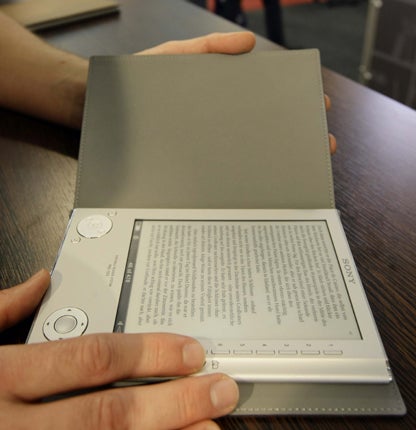It's too soon to write off the paperback
iPads, apps, e-publishing...When did settling down with a good book become such hard work?

There has been a buzz surrounding Ether Books since it launched at the London Book Fair last month.
Ether has created an iPhone app that lets customers download short stories and other short works onto their phone. Hilary Mantel, whose work appears on the site, is all in favour, suggesting that Ether's publishing model can "reach new readers" and give short fiction a "new and different life".
Short-story collections are notoriously hard for publishers to sell. This way you can just pick out what you want like a music download. Saki's "Down Pens" and Penelope Lively's "The First Wife" would be my first choices from Ether's eclectic and easy-to-search catalogue, which is organised by search categories like "Award Winners", "New Authors", and "Pocket Poems", and allows you to sample the first page of each work. So, as the Ether homepage instructs: "Sit back, sip your coffee and read your favourite author whenever you want and wherever you are."
Sounds good, but when I read those tag lines on e-publishing sites, I can't help but think, I do that already. I don't need help drinking coffee and reading in any given location. I'm rather good at it and have proved that I can do both simultaneously without recourse to technology.
But is this relevant? Digital publishing is going to be huge, of that there is no doubt. At this year's London Book Fair the Digital Zone was bigger than ever and the iPad in all its beautifully designed glory was the major talking point, with large publishers like Penguin and HarperCollins backing it to drive and dominate e-book market growth.
But does digital technology improve the experience of reading, especially reading fiction? Those aiming to make money out of e-book technologies need us to believe that it does. But can e-readers of whatever sort ever escape the whiff of functionality however impressively book-like they are?
Even when reading them for work, paper books and magazines are a refuge from the laptop I'm chained to for hours a day. Reading paper books is an escape from utility, information overload, endless possibility... and my obsessive-compulsive social-networking habits.
There's no doubt that the possibilities of digital are exciting. Just take a look at www.theliteraryplatform.com founded by writer and editor Sophie Rochester if you want an idea of how digital technologies are bringing "the traditional book format to new platforms". There's a lot going on.
But are consumers in danger of forgetting how to enjoy themselves on their own terms? The body language of e-reader users I spotted at this year's London Book Fair didn't exactly suggest relaxation or pleasure. From the lone frowning Kindle-user spotted on the Tube on the way to Earl's Court holding her expensive cargo stiffly on her knees as if any excess movement and the whole thing might blow, to the touch-screen tap-tappings of stressed-out publishers demonstrating book-reading on the iPad by dragging several times (and a little frantically) at the virtual pages to get them over, one can't help thinking that turning a real page would be more enjoyable and stress-free.
Ether's story app is a fantastic way of reaching modern readers in a hurry, and short stories are by their very nature fragments, offering us a glimpse of imagined lives. But is the act of reading becoming a bit too business-like, too practical? I don't think e-book technology will help us to "sit back", relax and enjoy ourselves more.
After all, more choice doesn't make us more content; having the text of hundreds of novels at your fingertips probably makes you less satisfied with the one you're actually reading. Amid all the marketing mayhem, readers should remember they can still decide what makes a reading experience valuable – it's not just up to Steve Jobs.
Anna Goodall is the editor of 'Pen Pusher Magazine' and a bookseller at Clerkenwell Tales in London
Join our commenting forum
Join thought-provoking conversations, follow other Independent readers and see their replies
Comments
Bookmark popover
Removed from bookmarks